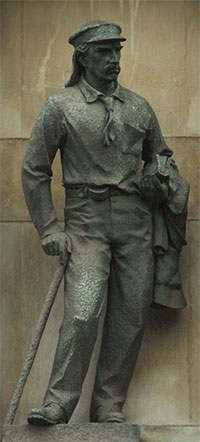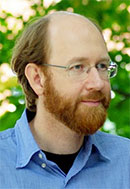
The travels of missionary, physician, and explorer David Livingstone are “officially” documented in The Last Journals of David Livingstone, published after his 1873 death, but an IUP professor is part of a team that has uncovered the uncensored version.
In 2009, Adrian Wisnicki, assistant professor of English and codirector of the Center for Digital Humanities and Culture who specializes in British literature, found pages from Livingstone's original diary and then worked with a team of experts and with the Library of Congress to make the entries legible. Many of them were written with makeshift ink and on old newspapers.
Wisnicki's work, which reveals Livingstone's more immediate and uncensored perspective on events that he witnessed, received international media coverage:
- Washington Post, November 1, 2011: “ Dr. Livingstone's Diary on Nineteenth-Century Africa, Now Uncensored”
- BBC News, November 1: “ Experts Shed Light on David Livingstone Massacre Diary”
- Associated Press, November 1: “ Newly Deciphered Diary Muddles Livingstone Legend”
- Scotland TV, November 1: “ Explorer David Livingstone's Diary Unveiled for the First Time”
- NewScientist, November 2: “ Paper Scans Unmask Livingstone's Fury at Slave Killing”
- Daily Mail (UK), November 2: “ Dr. Livingstone Lied, Scientists Presume: Spectral Imaging Uncovers Discrepancies in Explorer's Account of Slave Massacre”
- CBS News, November 2: “ Researchers Now Presume That Dr. Livingstone Lied”
- New York Times, November 7: “ Restored: Fading Account from the Heart of Africa”
The focus of the recovered journal entries is an 1871 attack by Arab traders on villagers in Nyangwe (now Congo). Journalist H.M. Stanley, who came to find Livingstone on behalf of the New York Herald newspaper, wrote several articles about the attack—based on Livingstone's original journal entries and verbal accounts—which helped to halt the East African slave trade.

Wisnicki explains that Livingstone's uncensored journal entries at the time of the event contain much more detail and differ in perspective from The Last Journals of David Livingstone.
To recover Livingstone's writings, the technology team used lights of different colors and computer processing to identify the lost text. The full diary text will be electronically hosted at the University of California at Los Angeles and is available at the UCLA Digital Library website.
Wisnicki will continue to study the text.